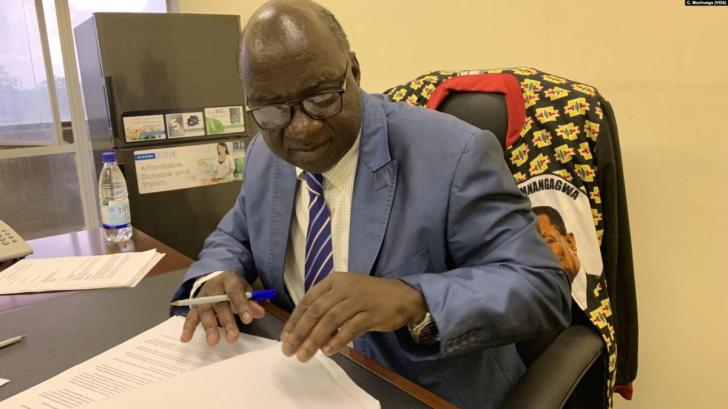News / National
Mahiya threatens war veterans opposing Mnangagwa's extended rule
3 hrs ago | Views

Zanu PF Secretary for War Veterans, Douglas Mahiya, has issued stern warnings to war veterans opposing President Emmerson Mnangagwa's extended stay in office, threatening to "stop them from speaking indefinitely." His comments, delivered during the launch of the Presidential War Veterans Fund and the Village Business Unit (VBU) empowerment program in Bulawayo, were primarily directed at a faction led by Blessed Runesu Geza, which has vocally criticized Mnangagwa's leadership, citing corruption, nepotism, and economic mismanagement.
Mahiya accused dissenting war veterans of undermining party unity and claimed their actions threatened the liberation movement's legacy. He invoked Resolution Number One from last year's Zanu PF National People's Conference in Bulawayo, which endorsed Mnangagwa's rule until 2030.
"If the majority want Mnangagwa to extend his term, the minority has no standing to oppose it," Mahiya said. "War veterans who think their past service gives them power to go against the party's resolutions are mistaken. If you oppose the president, your war credentials mean nothing."
Mahiya defended Mnangagwa as a "principled leader" whose presidency ensures stability, claiming that under different leadership, Zanu PF could have declared a state of emergency, suspended elections, and extended Mnangagwa's rule indefinitely. He characterized the country's sanctions as a "state of war," which he said justified extraordinary measures.
"We were sanctioned by the West. That's a sign of war. Under other leadership, we could have declared a state of emergency and said, ‘no elections,'" Mahiya said. "Mnangagwa is educated and listens to the people, but other leaders could have ruled indefinitely under these conditions."
Mahiya likened Mnangagwa's situation to former U.S. President Donald Trump, whom he claimed was being "positioned for another term" despite constitutional provisions.
Mahiya also alleged that emerging factions within the war veterans' ranks were being used to destabilize Zanu PF ahead of future elections. He warned that such divisions could lead to a loss for the ruling party and accused dissenting war veterans of being manipulated by external forces seeking to weaken Zanu PF.
"There are different war veteran associations forming to create disorder. This is being done to ensure Zanu PF loses in the next elections and pave the way for a government of national unity," he claimed.
Mahiya's remarks have sparked concerns, with critics arguing that they reveal the extent to which some Zanu PF leaders are willing to subvert democracy to maintain power. Political analyst Dr. Vusumuzi Sibanda warned that the push for Mnangagwa's extended presidency could deepen internal divisions within Zanu PF and erode democratic processes in Zimbabwe.
"Zanu PF's determination to extend Mnangagwa's rule, regardless of constitutional provisions or public sentiment, is alarming," Sibanda said. "The party's willingness to violate the law and suppress dissent should concern all Zimbabweans."
With growing tensions within the war veterans' ranks and broader concerns about Zanu PF's governance, Mahiya's remarks underscore the challenges facing the ruling party as it navigates internal dissent and public scrutiny. Whether Mnangagwa's extended presidency gains traction or further fractures Zanu PF remains to be seen.
Mahiya accused dissenting war veterans of undermining party unity and claimed their actions threatened the liberation movement's legacy. He invoked Resolution Number One from last year's Zanu PF National People's Conference in Bulawayo, which endorsed Mnangagwa's rule until 2030.
"If the majority want Mnangagwa to extend his term, the minority has no standing to oppose it," Mahiya said. "War veterans who think their past service gives them power to go against the party's resolutions are mistaken. If you oppose the president, your war credentials mean nothing."
Mahiya defended Mnangagwa as a "principled leader" whose presidency ensures stability, claiming that under different leadership, Zanu PF could have declared a state of emergency, suspended elections, and extended Mnangagwa's rule indefinitely. He characterized the country's sanctions as a "state of war," which he said justified extraordinary measures.
"We were sanctioned by the West. That's a sign of war. Under other leadership, we could have declared a state of emergency and said, ‘no elections,'" Mahiya said. "Mnangagwa is educated and listens to the people, but other leaders could have ruled indefinitely under these conditions."
Mahiya also alleged that emerging factions within the war veterans' ranks were being used to destabilize Zanu PF ahead of future elections. He warned that such divisions could lead to a loss for the ruling party and accused dissenting war veterans of being manipulated by external forces seeking to weaken Zanu PF.
"There are different war veteran associations forming to create disorder. This is being done to ensure Zanu PF loses in the next elections and pave the way for a government of national unity," he claimed.
Mahiya's remarks have sparked concerns, with critics arguing that they reveal the extent to which some Zanu PF leaders are willing to subvert democracy to maintain power. Political analyst Dr. Vusumuzi Sibanda warned that the push for Mnangagwa's extended presidency could deepen internal divisions within Zanu PF and erode democratic processes in Zimbabwe.
"Zanu PF's determination to extend Mnangagwa's rule, regardless of constitutional provisions or public sentiment, is alarming," Sibanda said. "The party's willingness to violate the law and suppress dissent should concern all Zimbabweans."
With growing tensions within the war veterans' ranks and broader concerns about Zanu PF's governance, Mahiya's remarks underscore the challenges facing the ruling party as it navigates internal dissent and public scrutiny. Whether Mnangagwa's extended presidency gains traction or further fractures Zanu PF remains to be seen.
Source - cite


























